Student Village Academy › Forums › GENERAL DISCUSSIONS › “OGUN OKUTA” (THE BATTLE OF THE STONE PELLETS)
Tagged: History, Student Village, yorub history
- This topic is empty.
-
AuthorPosts
-
-
August 11, 2022 at 9:54 AM #39150
 justseyiKeymaster
justseyiKeymaster“OGUN OKUTA”
(THE BATTLE OF THE STONE PELLETS)THE FIRST INDIGENOUS WAR IN AKURE.The ‘Ogun Okuta’ of 1931 was the first indigenous revolt in Akure.
“OGUN OKUTA” (THE BATTLE OF THE STONE PELLETS); Oba Olofinlade Afunbiowo Ojijigogungara Asodeboyede,Adesida I. The 41st Deji of Akure kingdom.

 It was during his reign Ogun Okuta happened.
It was during his reign Ogun Okuta happened.The war was fought against the obnoxious tax regime of the British officials and their collaborators (Oba Afunbiowo).
The British tax system was introduced to Akure like other parts of southern Nigeria in 1917.
But increment in the ‘head tax’ led to this revolt that defiled the sacred throne of the Deji.However, he deployed traditional wisdom in making sure that the revolt was quashed by the use of his chiefs and other notable people in Akure.
TAX COLLECTION
Shortly before the
Uprising like other towns in Nigeria.Akure was equally affected by the post-world war economic depression between 1929 and 1938.
During this period, prices fell so low that primary goods producing countries like Nigeria obtained less for their farm products.
Cocoa beans were sold at a very ridiculously low price.It was stocked by the companies that were involved in buying.
This led to a serious economic downturn, and in any society that is enmeshed in an economic crisis, people will naturally be aggressive and impatient.
This was visible in the reaction of the people to the call by the leadership of the revolt to disregard the payment of increased head tax.Oba Afunbiowo sided with the colonial Government when they introduced, for the first time in Akure history official tax
Collection from Akure people.This tax was seen as oppressive and the people rioted against him in what is now referred to as “Ogun Okuta” (the Battle of the stone pellets) in Akure.
when the Palace was placed under siege and Kabiyesi (one whose authority is unquestionable)
He was stoned by his own people for his decision to side with the colonial Government for introducing tax collection by force.The Deji did not budge but effectively quell the insurgents and to put down the rebellion.
According to history,it was a general practice of
All the Customary Court Clerks at this period that when anyone wanted to file a case.The litigant must bring six shillings for the form.
Some tubers of yam, a cock, a load of firewood and a big bottle of locally made gin before his case could be heard in the Court.
This made life hard for the people and made some people report the case to the District Officer (D. O.), Mr G. G.Harris at Ado-Ekiti issued a query to one of the court clerks involved, Mr F. S. Adeoba.
It was at this period, July 1, 1931, that Adeoba the court
Clerks informed the king that the payment of six shillings ‘head tax’ was to begin, which made the people of Akure rise against it.They thought that all their communal projects were done through self-efforts.
They began to ask the question as to what had the king done
For them with the taxes collected so far?Many of the leaders of the revolt were not only aggrieved because of the tax increment.
But also because of the benefits, the princes and princesses enjoyed the period.
It was argued that the community money was used to sponsor the
The princes and princesses to schools.The decision and determination to wage a war of emancipation from taxation became the household word in Akure and its environs.
But the Deji continued to appeal to the people by making the people understand that the tax was not imposed
On them by him.Yet, instead of listening to the king, the people became more antagonistic through continued protests and attacks on the colonial officials.
During a meeting between the Akure people and the District Officer, the spokesman of the people Mr Akomolede
Asked the D. O. what had the king done with the taxes collected every year.Why should the people pay taxes that would be embezzled by a man?
He concluded that unless the Deji could agree that each person should be paying three shillings
If not, the people would pay nothing because they did not buy their heads from anyone.The response of the District Officer was that the people of Akure did not understand the rationale behind taxation.
The officer explained that it was not the king that collected
The taxes but the government and that if their communal jobs were being done by themselves then.
A time would come when the government would take over its responsibilities.
THE DAY OGUN OKUTA STARTED
On July 27, 1931, the D. O. in the company of Native Authority Police and tax
Collectors assembled at the Akure Native Court No I Hall with Oba Afunbiowo in attendance.They sent to the Akure people to pay their tax-a directive with which a minority of the natives complied.
The spokesman; Mr. Akomolede was brought to the D. O to pay the reduced tax of five
And half shillings.He refused and asserted that he could only pay three shillings.
Because of this, he was arrested by the N. A. police. The news of his arrest spread like wildfire.
On hearing this, the people of Akure threw stones at king Deji Afunbiowo Adesida I and the
And the Resident, G. G.Harris inside the court (that was where the nomenclature of the war derived from Ogun Okuta).In a fit of anger, they rushed inside the court, turned the tables upside down and disorganised the Court Hall.
As a result of this, N. A.police besieged Akure up to
August 11, 1931.They spent several months before some of the leaders of the revolt could be arrested and after they had jailed many Akure indigenes and forced many to go into exile.
Several farm products; livestock and other valuable goods were destroyed.
History reveals that the ‘Ogun Okuta’ was not fought primarily against the increment in head tax.Hence, other factors such as the benefits the princes and princesses enjoyed during the period.
This agrees with the saying that there is no monocausal in history.
HOW OBA AFUNBIOWO SOLVED THE CRISISThe first thing Oba Afunbiowo did was to mobilise his Council of Chiefs and other prominent Akure sons and daughters.
To appeal to aggrieved people and let them know that he was not the one that spent the money realised from
The tax as alleged.Many of the leaders of the revolt were not only aggrieved because of the tax increment.
But also because of the closeness of the monarch and the benefits the princes and princesses enjoyed the period.
The Deji and his chiefs debunked all these allegations.
Oba Afunbiowo deployed his legendry accommodating disposition,liberalism,diplomacy, and traditional wisdom in resolving the crisis.Without foreign police assistance by making sure that he worked towards the release of his subjects that were arrested
And detained so that relative peace could return to Akure and its environs.It was said that Oba Afunbiowo consulted and appeased the oracle for the peaceful resolution of the crisis.
Also,he made use of his traditional chiefs and prominent indigenes in appealing to leaders
Of the revolt which as a corollary aided the release of the arrested leaders of the revolt.Another method deployed by the king was that he threatened to abdicate the throne.
if the people refused to allow peace and tranquillity to reign in the kingdom.
It was a common knowledge among the people that it is a taboo for a king to abdicate the throne under such a circumstance.Some of the custodians of the traditions reviewed the calamity that might bring into the Kingdom and prevailed on the people to embrace peace and dialogue.
As a result of all the crisis resolution mechanisms put in place.Oba Afunbiowo was able to secure the release of all the leaders of the revolt that were kept in the British solitary confinements.
This brought about relative peace and tranquillity in Akure and its environs
And the Monarch was able to resume his customary duties without harassment and intimidation.Story credit;Oluwafemi Omodara
Thanks for reading! “OGUN OKUTA” (THE BATTLE OF THE STONE PELLETS)
-
-
AuthorPosts
- You must be logged in to reply to this topic.
